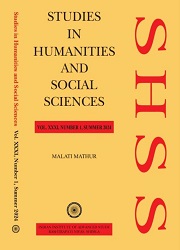Representation of Kashmiriyat in Rehman Rahi’s Poetry
Keywords:
Kashmiriyat, Lal Ded, Sheikh-Nooruddin, Mother KasheerAbstract
Abdul Rehman Rahi, popularly known as Rehman Rahi, is one of the most distinguished poets of Kashmir who has made a significant contribution to Kashmiri literature and poetry. Though a literary figure of diverse interests he eventually consolidated his position as a poet of Kashmiri language. He was awarded prestigious awards like SahityaAkademi Award for his poetry collection Nawroz-i-Saba, Padma Shri and Jnanpith Award. He is the first and the only Kashmiri to be awarded the Jnanpith Award for his poetry collection Siyah Rood Jaren Manz. The argument of the present paper is that Rahi as a poet foregrounds the essential inclusiveness of Kashmiri culture across his poetry. It will not be an exaggeration to call him a poet of all Kashmiris-be they Hindus, Muslims and Sikhs. The present paper attempt to highlight how how Rahi blends the pluralistic, cosmopolitan and syncretic ethos of Kashmir represented by both Islamic Sufism and Hindu Shaivism. In his poetical works like Nawroz-i-Saba (Advent of the Spring Breeze, 1958) to SiyahRoode Jaren Manz (In Dark Downpours, 1998) he has crafted a new poetics of literary modernity which is that of an intellectual engagement with Kashmir’s dense spiritual and intellectual history from Abhinavgupta, Lal Ded and Sheikh NuruddinNoorani. He is also influenced by the mystic poetry of Lalla and Shams Faqir, modern Persian writers and Western writers like Hopkins and Eliot. He also uses symbols of Greek, Islamic and Hindu mythology. He gives expression to the great, grand, noble, profound and perennial elements of the tradition of Kashmir. The best example of it is his poem which Kashmir University has adopted as it’s tarana which highlights Rahi’s boundless horizon of imagination, his assimilative power and his grasp of the quintessential intellectual, spiritual, religious, artistic genius of Kashmir. In short, the attempt of this paper is to foreground what has been called Kashmiriyat by many critics as is manifested in many of his poems.


